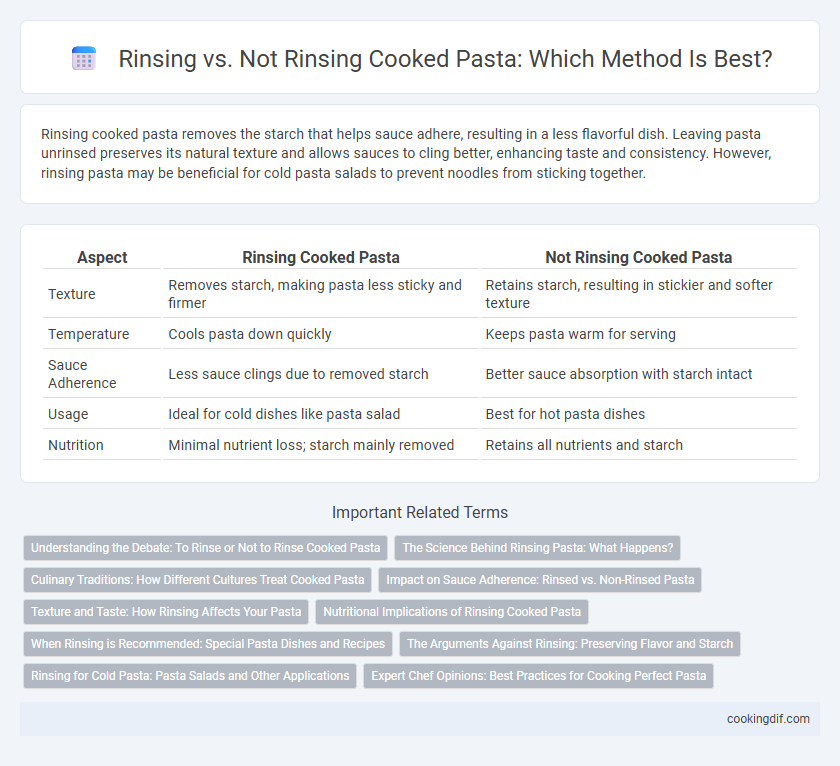Rinsing cooked pasta removes the starch that helps sauce adhere, resulting in a less flavorful dish. Leaving pasta unrinsed preserves its natural texture and allows sauces to cling better, enhancing taste and consistency. However, rinsing pasta may be beneficial for cold pasta salads to prevent noodles from sticking together.
Table of Comparison
| Aspect | Rinsing Cooked Pasta | Not Rinsing Cooked Pasta |
|---|---|---|
| Texture | Removes starch, making pasta less sticky and firmer | Retains starch, resulting in stickier and softer texture |
| Temperature | Cools pasta down quickly | Keeps pasta warm for serving |
| Sauce Adherence | Less sauce clings due to removed starch | Better sauce absorption with starch intact |
| Usage | Ideal for cold dishes like pasta salad | Best for hot pasta dishes |
| Nutrition | Minimal nutrient loss; starch mainly removed | Retains all nutrients and starch |
Understanding the Debate: To Rinse or Not to Rinse Cooked Pasta
Rinsing cooked pasta removes the starchy surface that helps sauces cling, potentially leading to a less flavorful dish, especially in Italian recipes where texture and sauce adhesion are key. However, rinsing can cool pasta quickly and prevent sticking, which is beneficial for cold dishes like pasta salad or when preparing pasta in advance. Understanding when to rinse depends on the intended dish and cooking method, balancing texture, temperature, and sauce integration for optimal results.
The Science Behind Rinsing Pasta: What Happens?
Rinsing cooked pasta removes the starch surface layer, which can prevent sauce from adhering properly, resulting in a less flavorful dish. The starch acts as a natural binder, enhancing texture and sauce absorption, so leaving pasta unrinsed maintains optimal mouthfeel and taste. However, rinsing is beneficial when pasta is used in cold dishes or stored for later use, as it stops the cooking process and prevents sticking.
Culinary Traditions: How Different Cultures Treat Cooked Pasta
Italian culinary tradition emphasizes not rinsing cooked pasta to preserve its starches, which helps sauce adhere better and enhances flavor. In contrast, Asian cuisines, like those in Chinese and Thai cooking, often rinse noodles to remove excess starch, preventing clumping and achieving a cleaner texture for stir-fries or cold dishes. This cultural difference highlights how pasta preparation techniques are tailored to complement specific sauces and cooking methods.
Impact on Sauce Adherence: Rinsed vs. Non-Rinsed Pasta
Rinsing cooked pasta removes the surface starch that helps sauces cling, resulting in a smoother but less adhesive texture. Non-rinsed pasta retains natural starches, enhancing sauce adherence and flavor integration for a richer dining experience. Optimal sauce coating depends on maintaining these starches to create a harmonious blend of pasta and sauce.
Texture and Taste: How Rinsing Affects Your Pasta
Rinsing cooked pasta removes the surface starch, resulting in a less sticky texture but also diminishing its ability to hold sauce properly. Without rinsing, the pasta retains its natural starch, enhancing sauce adhesion and delivering a richer taste experience. Chefs typically avoid rinsing to preserve both the ideal texture and flavor intensity of the dish.
Nutritional Implications of Rinsing Cooked Pasta
Rinsing cooked pasta removes surface starches that help sauce adhere but also washes away some nutrients like B vitamins and iron. Avoiding rinsing preserves these water-soluble vitamins, enhancing the pasta's nutritional value and flavor absorption. However, rinsing can reduce the glycemic index slightly by removing starch, which might benefit those managing blood sugar levels.
When Rinsing is Recommended: Special Pasta Dishes and Recipes
Rinsing cooked pasta is recommended for cold dishes like pasta salads or when preparing recipes that involve chilling the pasta to prevent sticking and remove excess starch. In Asian cuisine, rinsing noodles after boiling helps achieve the desired texture by stopping the cooking process and cooling them rapidly. For dishes requiring a sticky sauce to adhere, such as classic Italian pasta with robust tomato or cream sauces, not rinsing preserves the starch which enhances sauce absorption.
The Arguments Against Rinsing: Preserving Flavor and Starch
Rinsing cooked pasta removes the natural starch that helps sauces adhere, resulting in a less flavorful dish. The starch layer on pasta enhances the texture and allows the sauce to cling, creating a balanced taste experience. Avoiding rinsing preserves the pasta's optimal flavor and improves the overall mouthfeel of the meal.
Rinsing for Cold Pasta: Pasta Salads and Other Applications
Rinsing cooked pasta is essential for cold pasta dishes like pasta salads to halt the cooking process and prevent clumping by removing surface starch. Cold water rinsing also cools the pasta quickly, ensuring it maintains a firm texture ideal for salads and other cold applications. This method enhances flavor absorption from dressings and ingredients, creating a more balanced and enjoyable dish.
Expert Chef Opinions: Best Practices for Cooking Perfect Pasta
Expert chefs recommend not rinsing cooked pasta to preserve its starchy surface, which ensures sauces adhere better, enhancing flavor and texture. Rinsing removes this beneficial starch layer and cools the pasta, disrupting optimal sauce absorption and the ideal al dente bite. In professional kitchens, pasta is drained and immediately tossed with sauce to achieve the perfect balance of texture and taste.
Rinsing vs not rinsing for cooked pasta Infographic

 cookingdif.com
cookingdif.com